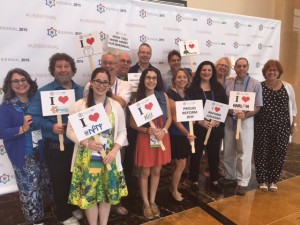The Union of Reform Judaism held its Biennial November 4–8 in Orlando, Fla., and I had the honor of attending as a member of Ohef Sholom Temple’s board of directors. The URJ Biennial experience can be summed up as follows:
• Three weeks’ worth of programming, education, and celebration shoehorned into four very long days.
• A massive Jewish summer camp, North American Federation of Temple Youth (NFTY), and college reunion (especially if you are a graduate of Hebrew Union College-Jewish Institute of Learning).
• A festival of Jewish music that rivals Woodstock. • The Olympiad of Jewish geography and genealogy.
• An extremely personal and private retreat to ponder what your Judaism means to you (while being constantly surrounded by 5,000 fellow Jews).
Highlights of Biennial included an overwhelming vote by the assembled body on Thursday, Nov. 5, in favor of a policy of nondiscrimination against transgender individuals in all facets of the Reform Jewish movement, the first such action by a significant American religious organization. Plenary panels on fostering inclusivity in temples, promoting racial justice in communities, and advocating for peace and equal rights in Israel featured notable speakers such as actor Michael Douglas, New York Times writer Jodi Kantor, author Ari Shavit (My Promised Land), national NAACP President Cornell Brooks, and Beit Knesset member Stav Shaffir.
Daily and Shabbat worship and Torah study incorporated traditional texts as well as readings and music spanning our tradition from Moses and Maimonides to Mitch Albom and Matisyahu; and attendees chose from among more than 130 learning sessions on temple governance, community engagement, and study of Jewish history and philosophy.
Conference sessions and worship were interwoven with performances and song sessions by well-known contemporary Jewish musicians including Josh Nelson, Dan Nichols, Billy Jonas, Peri Smilow, Julie Silver, a capella group Six13, Shira Kline, and numerous American Conference of Cantors members including Ohef Sholom’s own Cantor Wally Schachet-Briskin.
A rousing, inspiring, and often personally reflective speech by Vice President Joe Biden on Saturday night capped off Biennial in memorable fashion. Vice President Biden spoke for the better part of an hour, reflecting on his decades of support from the Jewish community on social justice issues and his tireless work in fostering the United States’ enduring partnership with Israel. Biden spoke candidly and optimistically about the current state of Israel-U.S. relations and America’s continued support of Israel as its chief ally in the region, his timely remarks coming just days before Prime Minister Netanyahu’s visit to Washington. The conference was also not without its tearful moments, especially during a commemoration of the life and accomplishments of Yitzhak Rabin on the 20th anniversary of his assassination.
The URJ’s three main platforms— Audacious Hospitality, Strengthening Congregations, and Tikkun Olam—were fully integrated into all aspects of the Biennial. Attendees were encouraged to engage the challenges facing the Jewish community both from within and without, in our own communities and in the world. No topic was too difficult or controversial, from incitement and acts of terrorism in Israel to mass shootings and acts of racial injustice in our own communities.
By virtue of its large delegation of 17 members, Ohef Sholom enjoyed “platinum” status at the Biennial, which allowed our group to have preferred seating for the plenary sessions and specially targeted networking opportunities, while spending more than 500 collective hours learning, praying, and enjoying each other’s fellowship.
Biennial was a highly personal experience for me, evoking fond memories of summers at URJ Jacobs Camp in Utica, Miss., and my active career in NFTY’s southern region, including joyful reunions with many close friends from that time. I learned a great deal about how we can make our synagogue stronger and become more of a part of our community in facing the challenges that are part of our tradition of Tikkun Olam.
Most of all, I took great pride in the Reform movement’s commitment to audacious hospitality and inclusiveness in all aspects of our communal life. For me, the most inspiring words came not from an esteemed rabbi or scholar, but from Ben Spratt, president of Atlanta’s largest Reform congregation, in addressing how our congregations and community should address whether we can truly be houses of prayer for all people and work for a more just and righteous world: “Start with yes, and work your way backwards.”
by Andy Fox


